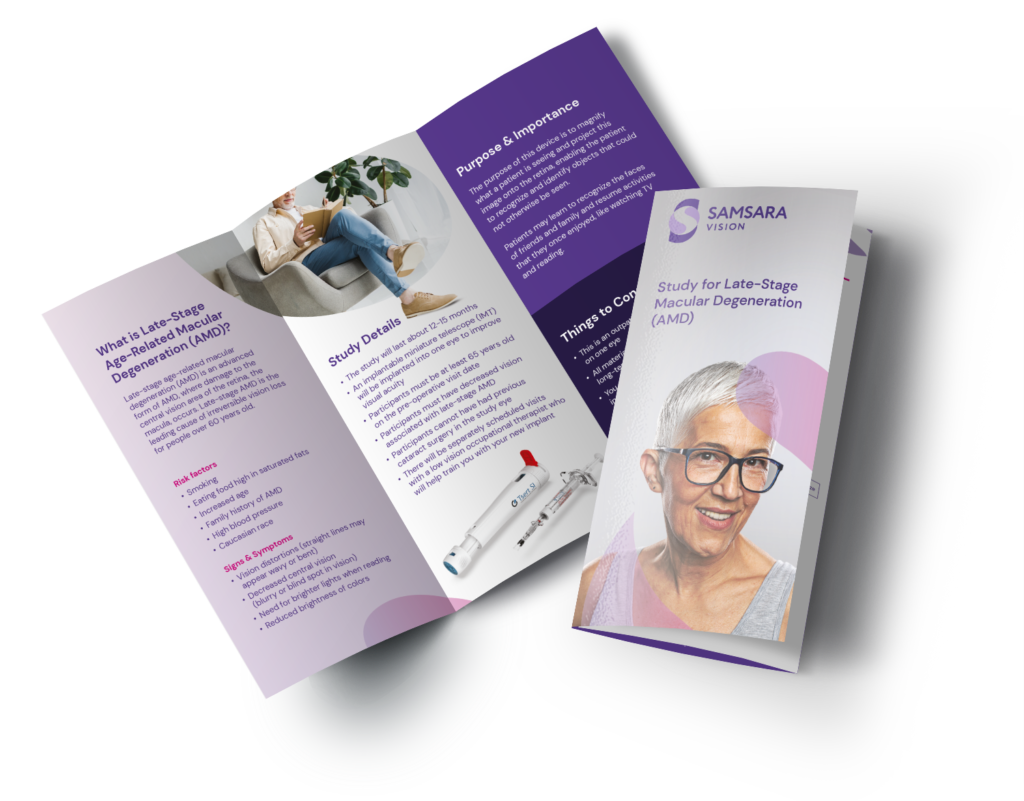This website uses cookies so that we can provide you with the best user experience possible. Cookie information is stored in your browser and performs functions such as recognising you when you return to our website and helping our team to understand which sections of the website you find most interesting and useful.



Are You or a Loved One Living with Late-Stage Age-Related Macular Degeneration (AMD)?
We are conducting a clinical research study on an investigational, new version of the Implantable Miniature Telescope (IMT), called the SING IMTTM (Smaller-Incision New- Generation). The study will evaluate improvements in visual acuity and safety of the device in people living with late-stage AMD in both eyes.
The purpose of the implant is to enable qualified patients to recognize and identify objects that they may not otherwise be able to see, as a result of their central vision loss due to AMD.
Already approved in Europe, the SING IMTTM design differs from the original device since it can be inserted through a device delivery system that allows for a smaller incision and less complicated surgery.
Interested in participating?
About the Study:
To qualify to participate, patients must:

Be 65 years of age or older

Have decreased vision associated with late-stage AMD in both eyes.

Have a history of cataracts

Have not yet had cataract surgery in at least one eye
Participation will last up to 15 months and require approximately 7 in-person visits to the study site. Those who qualify and participate will be compensated for their time and effort. Fill out the form below to be contacted by a Patient Experience Specialist if you qualify.
Current Study Locations:
We are currently conducting this study nationwide with new locations coming soon. Take a look at our current locations below to find out if we have a study location near you.
- Asheville, NC
- Cleveland, OH
- Eatontown, NJ
- Houston, TX
- Lawrence, MA
- Loma Linda, CA
- Long Beach, CA
- Omaha, NE
- Pasadena, CA
- Sarasota, FL
- Troy, MI
If transportation is needed, in many situations it can be provided both to and from the study facility at no cost to you.



For Physicians
If you are interested in referring late-stage AMD patients to the CONCERTO study you may have the patient/caregiver call +1-978-200-0472 to discuss eligibility, potential participation, and to answer any questions they may have.
You may also download our patient brochure and patient guide to share with your patients for more information.
Click the button below to download today. For additional questions about the Concerto study, patient referrals and study participation please contact
Dr. Rebecca Kammer rkammer@samsaravision.com
For Interested Patients/Caregivers:
If you want to learn more, or to see if you or a loved one qualifies for the CONCERTO study:
Fill out the contact information. You will be contacted for a pre-screening discussion within 72 hours.
Or call +1-978-200-0472 to discuss eligibility, potential participation, and to answer any questions you may have.
For Interested Patients/Caregivers:



What to Expect from
Your
Research Journey
Patient Frequently Asked Questions
Late-stage age-related macular degeneration (AMD) is an advanced form of AMD, where damage to the central vision area of the retina, the macula, occurs. Late-stage AMD is the leading cause of irreversible vision loss for people over 60 years old.
All of your study visits and rehabilitation are covered and there is no need to bill your insurance, and you can continue with your own provider for general care. In fact, you will be compensated for your study-related time and travel.
In many situations transportation can be provided both to and from the study facility.
This is an outpatient procedure performed during cataract surgery, you would go home within a few hours after surgery. The recovery from surgery is relatively rapid. Any discomfort from the surgical procedure generally subsides within several days.
- Follow-up Visits:
- You will be under the care of the ophthalmologist from the research trial. Your vision will be checked, and various tests will be performed both prior to and after the telescope implant procedure. You will need to return to your investigational center for examination at each of the required visits.
- Vision Training:
- Training is needed to help adapt to the SING IMTTM. This starts about the second week after the procedure and continues approximately every other week for the first three months. During this time, you will be taught the basic vision skills necessary to adjust to and maximize the use of your new vision so you can perform your daily tasks.
- Medications:
- You will have to use eye drops as recommended by your doctor before and after the procedure. You will be provided detailed instructions on what eye drops must be used and how frequently by your doctor.
- Eye Patch:
- You may experience double vision or unequal vision as a result of the two different images being received by the brain. The operated eye with the SING IMTTM will have magnified central vision, while the other eye will retain peripheral vision. In most cases, this state of unequal vision is transient and simply requires temporary patching of one eye.
The telescopic implant does not limit your natural eye movements and does not require you to move your entire head, as you have to do with external magnifying appliances. You can use natural eye movements to see things that are close and far away from you, such as reading printed materials or watching television. As a tradeoff to improving central vision, the peripheral (side) vision will be restricted in the eye with the telescope implant. However, your peripheral vision will stay the same as before the surgery in your non-implanted eye.
The telescope is virtually unnoticeable to others because it is implanted totally inside the eye, and mostly covered by the colored portion of the eye (iris).






